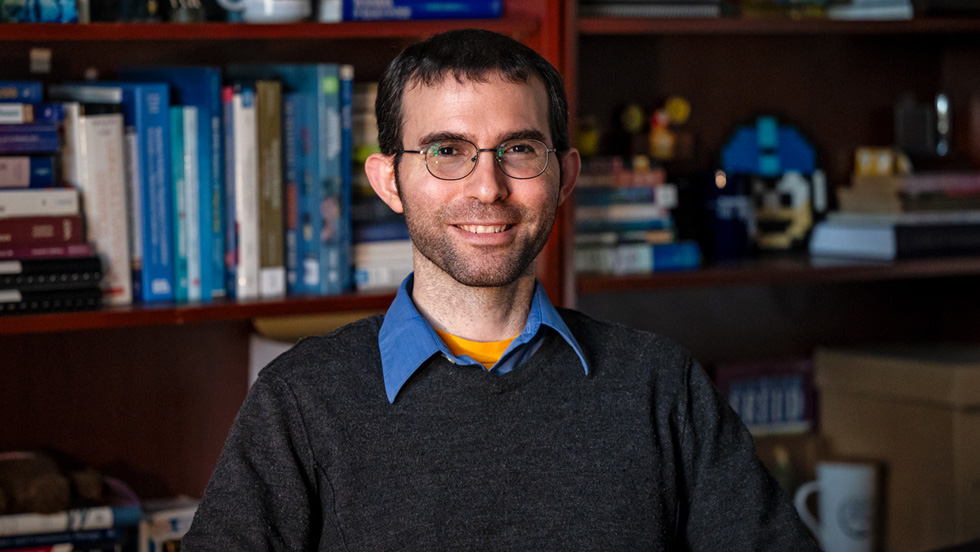
Michael Moore, PhD, studies how people's thoughts can lead to depression and anxiety. His hope is that Adelphi will train more people from underrepresented groups to help those in need.
Michael Moore, PhD, associate professor in the Gordon F. Derner School of Psychology, has taught undergraduate and doctoral students at Adelphi for 10 years and has more than 20 years of research experience, specializing in cognitive behavioral therapies and advanced qualitative analyses. He’s also engaging enough to share on Instagram his expertise on psychology and horror movies.
And now he’s taken on a new role: director of the Gordon F. Derner School of Psychology clinical psychology doctoral program. He was unanimously approved by the faculty and officially became director in October, succeeding Laura Brumariu, PhD. She and Katherine Fiori, PhD, are now associate deans, and Errol Rodriguez, PhD, is the assistant dean.
“When I came to Adelphi about 10 years ago, I taught mostly in the undergraduate program and gradually became more involved in administration of the program,” Dr. Moore said. “About four years ago, I began teaching more in the doctoral program and worked with the former director on projects. So, becoming director is sort of a natural transition.”
Asked what changes he wants to implement, Dr. Moore said, “Admissions is something I’ve got my eye on. That process has been unchanged for awhile. My plan this year is to use a data-driven approach to see what’s working really well, what we want to leave alone and what we could improve on a bit.”
Making the Case for Diversity in Psychology
Championing diversity in psychology is of particular interest to Dr. Moore. Not long after the Centereach, Long Island, native earned his bachelor’s degree at Stony Brook University and graduate degrees at Kent State University, he taught at Jackson State University, a historically Black school in Mississippi.
“Diversity enriches the whole educational experience. It’s a better experience for teachers. I got to hear how people navigate the world in a way that may be different from how I navigate it,” he said. “Psychology is still a predominantly white discipline.”
According to the American Psychological Association, the percentage of nonwhite psychologists in the United States was 14.1 percent in 2020 while the U.S. population was 38 percent nonwhite.
“There are benefits to working with people who see the world in a different way and see the profession in a different way,” Dr. Moore said. “We can train more psychologists from groups that are underrepresented.”
Influencing More People to Seek Help
A desire to return home and teach in the tristate area prompted Dr. Moore to leave Jackson State. He is impressed with Adelphi’s diverse student body, but also believes there is room for improvement.
“Part of the learning experience is being around people who are different from you,” he said. “I think there’s evidence that we’re doing a good job of that. But that’s not to say we can’t do a better job. We spend a lot of time talking about how we can make this school more open and welcoming to as many people as possible. That’s the goal.”
Dr. Moore is a firm believer that having more psychologists from underrepresented groups would benefit society.
“Maybe more people can get help because they see somebody in the field that makes them say maybe this person understands where I’m coming from,” he said. “Maybe they’ll try therapy and maybe it’ll work for them and maybe they’ll say this is something I want to do for a living.”
Encouraging Students to Express Themselves
Dr. Moore praised Derner’s diversity council, which developed talking points for how professors can discuss sensitive issues in class, such as the pandemic and the Israel–Hamas war.
“You’re doing a disservice to students if you’re not discussing those issues in class and giving them a chance to be heard,” he said. “It’s about creating an environment that fundamentally makes them feel comfortable expressing what they want to express. If folks come to Adelphi and feel heard and seen and they know that people care, then word gets out.”